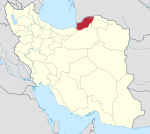Qarah Su-ye Sharqi Rural District
Appearance
Qarah Su-ye Sharqi Rural District
Persian: دهستان قرهسو شرقی | |
|---|---|
| Coordinates: 36°53′37″N 54°11′30″E / 36.89361°N 54.19167°E[1] | |
| Country | Iran |
| Province | Golestan |
| County | Torkaman |
| District | Si Joval |
| Capital | Qarah Qashli |
| Population (2016)[2] | |
• Total | 5,642 |
| Time zone | UTC+3:30 (IRST) |
Qarah Su-ye Sharqi Rural District (Persian: دهستان قرهسو شرقی) is in Si Joval District of Torkaman County, Golestan province, Iran. Its capital is the village of Qarah Qashli.[3]
History
[edit]After the 2006 National Census, villages were separated from the Central District in the establishment of Si Joval District, and Qarah Su-ye Sharqi Rural District was created in the new district.[3]
Demographics
[edit]Population
[edit]At the time of the 2011 census, the rural district's population was 5,167 in 1,277 households.[4] The 2016 census measured the population of the rural district as 5,642 in 1,505 households. The most populous of its nine villages was Qarah Qashli, with 2,731 people.[2]
See also
[edit]References
[edit]- ^ OpenStreetMap contributors (18 October 2024). "Qarah Su-ye Sharqi Rural District (Torkaman County)" (Map). OpenStreetMap (in Persian). Retrieved 18 October 2024.
- ^ a b Census of the Islamic Republic of Iran, 1395 (2016): Golestan Province. amar.org.ir (Report) (in Persian). The Statistical Center of Iran. Archived from the original (Excel) on 29 March 2019. Retrieved 19 December 2022.
- ^ a b Davodi, Parviz (c. 2024) [Approved 23 January 1388]. Approval letter regarding national divisions in Torkaman County. lamtakam.com (Report) (in Persian). Ministry of the Interior, Council of Ministers. Proposal 100837/42/1; Notification 19104/T41227H. Archived from the original on 13 February 2024. Retrieved 13 February 2024 – via Lam ta Kam.
- ^ Census of the Islamic Republic of Iran, 1390 (2011): Golestan Province. irandataportal.syr.edu (Report) (in Persian). The Statistical Center of Iran. Archived from the original (Excel) on 17 January 2023. Retrieved 19 December 2022 – via Iran Data Portal, Syracuse University.


